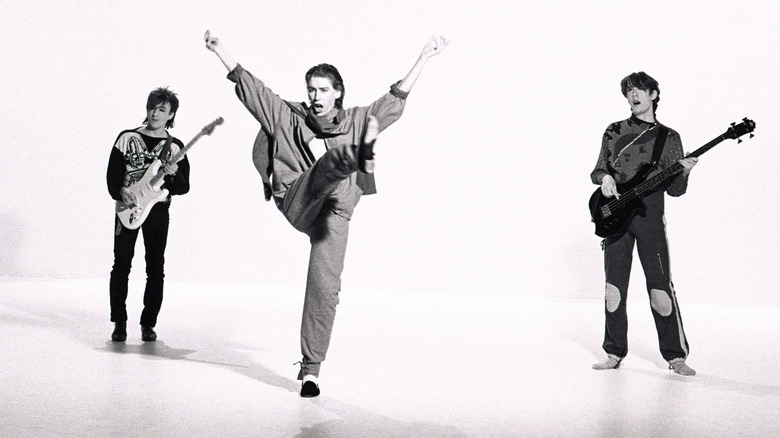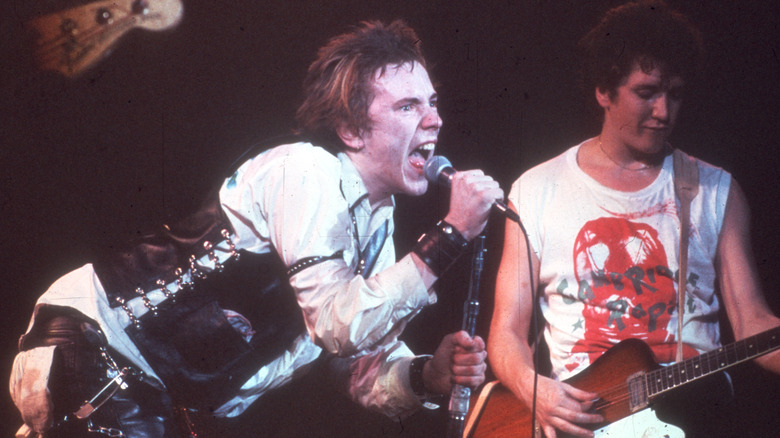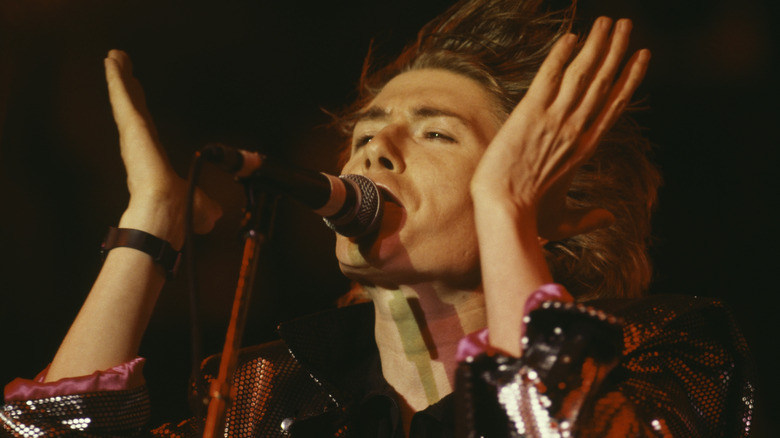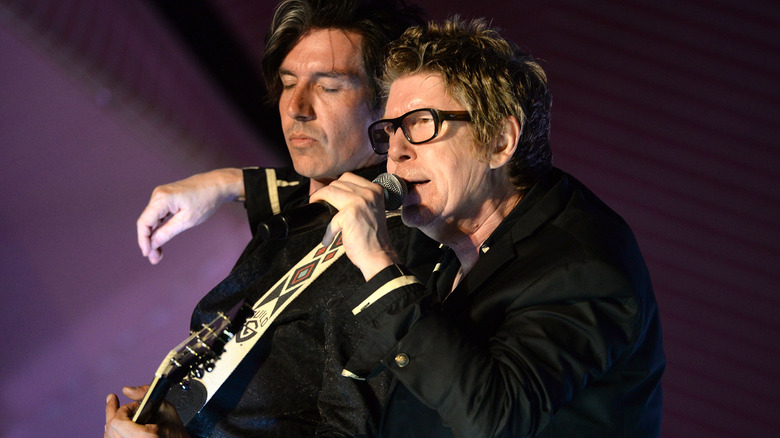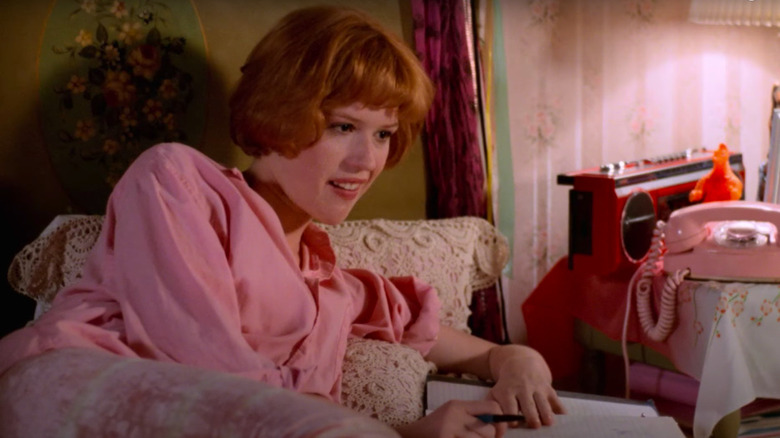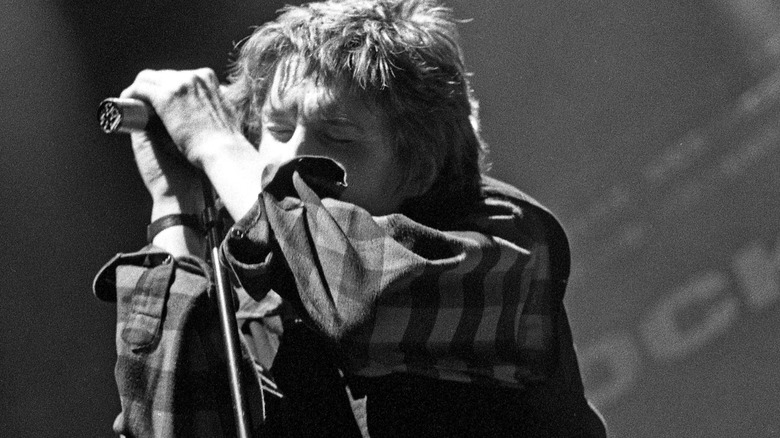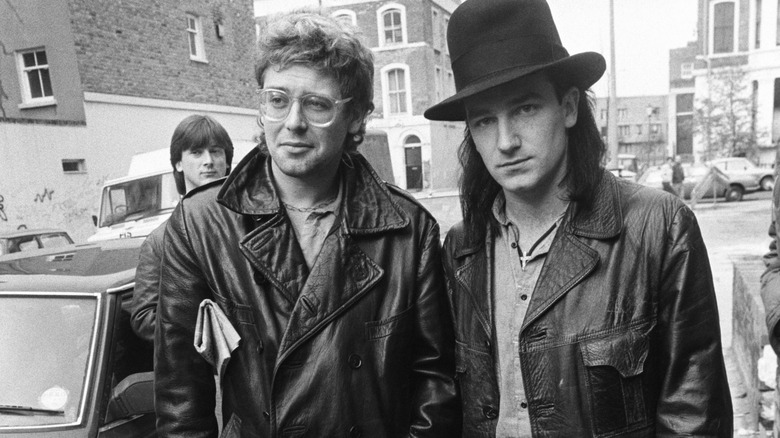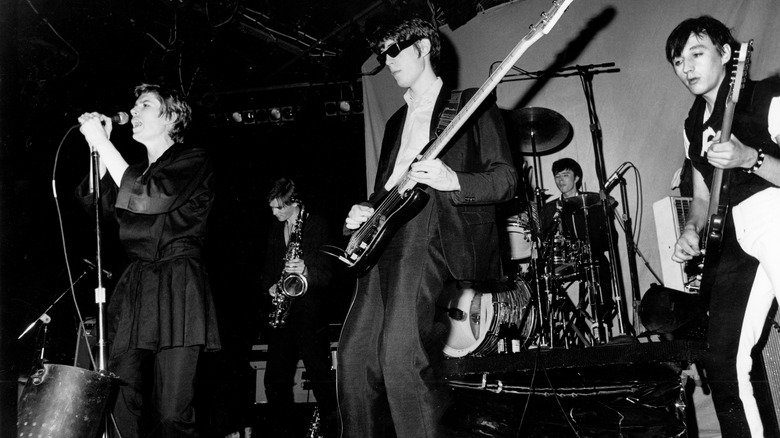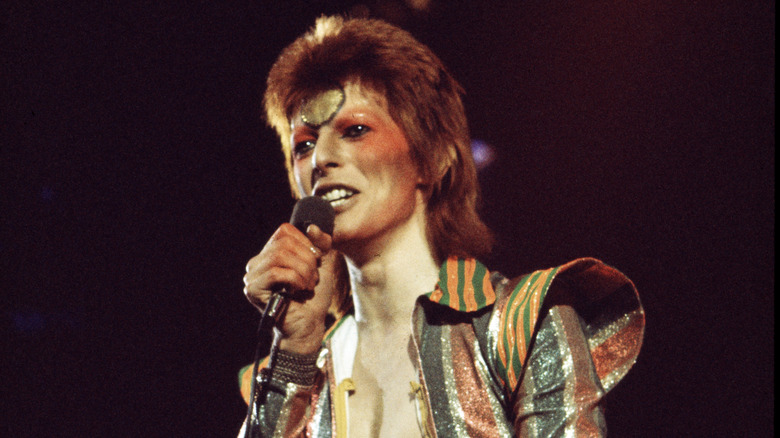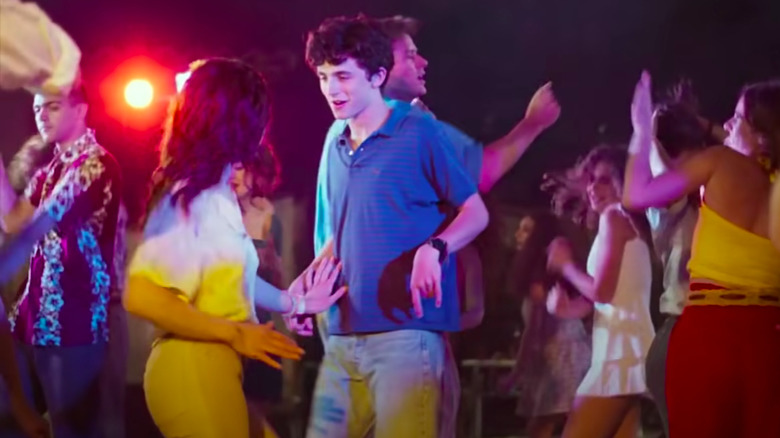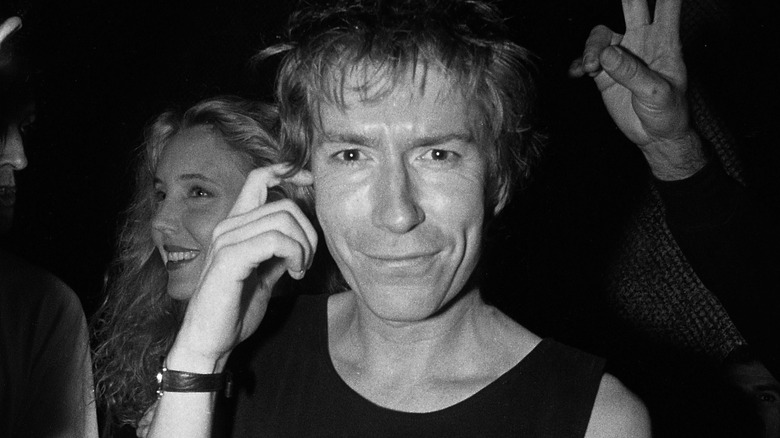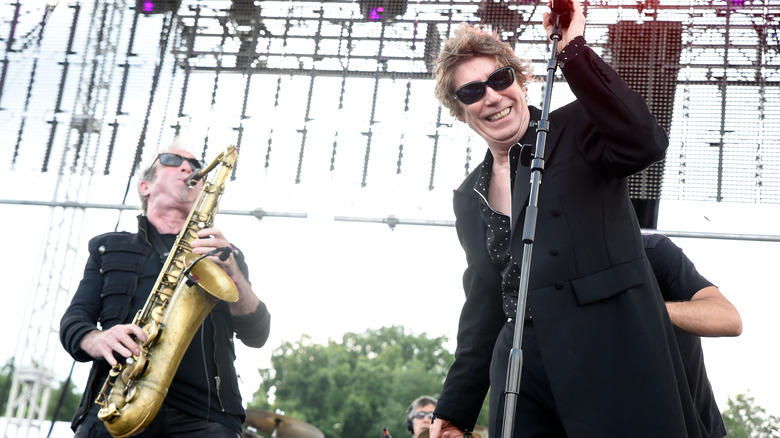The Untold Truth Of The Psychedelic Furs
The Psychedelic Furs are one of the many bands that were birthed during the U.K.'s post-punk scene in the late '70s and early '80s, but they never achieved the sort of legendary global following that Joy Division, the Cure, and Bauhaus did. Perhaps it was due to their ever-changing genre-bending: according to AllMusic, from post-punk, the band migrated to synth-pop, followed by dance-rock, to ultimately, a mainstream alternative sound that may have been the result of a certain iconic John Hughes flick — but more on that later.
The band's early lineup in 1977 consisted of brothers Richard and Tim Butler on vocals and bass guitar, respectively, Duncan Kilburn on the saxophone, drummer Paul Wilson, and Roger Morris on guitars. Within two years, they replaced Wilson with Vince Ely and gained their second guitarist, John Ashton. "We were a weird band, with the energy of punk, but we wanted to take it in more trippy directions," reflected Tim Butler to Tucson Weekly in 2013. "We were known to have a 'wall of sound,' but that came out of the fact that none of us really knew how to play our instruments and we were all striving to be heard."
So, how did a band with no definite genre and by their admission, no real musical background, have such great success in the 1980s, create songs that defined an entire generation, and inspire modern-day artists? This is the untold truth of the Psychedelic Furs.
They formed a band after seeing the Sex Pistols live
In 1984, Peter Buck of R.E.M. fame declared that, according to Brian Eno, "every single one of the 20,000 people who bought the Velvet Underground's first album eventually formed a band" (via The Morning Call). Although the Psychedelic Furs are definitely one of the bands who took influence from the Velvet Underground, it's not exactly where the majority of their early inspiration came from. In fact, as bassist Tim Butler told Ink19, he believes the Furs are, if anything, a combination of Roxy Music and the Sex Pistols. "That's one of the reasons why we started in the first place," he exclaimed, adding, "The Sex Pistols brought an energy back to music."
It was the "aggression and energy" of the Sex Pistols that inspired Tim and his brother, Richard, to form their own band. While speaking to NPR in 2020, Richard elaborated further on the now-legendary 1976 concert, revealing, "we'd never seen so much intense anger." The anger gave Richard confidence, too. He said that he never considered himself a musician until punk music paved the way.
And so, the Psychedelic Furs were formed, and the band began performing in the living room of the Butler family home in Surrey, England until they were kicked out for being too loud (via Tucson Weekly). According to Tim, the lads were already playing London shows, eventually drawing around 1,000 fans before even getting signed.
How did the Psychedelic Furs come up with their sound?
The early work of the Psychedelic Furs, particularly their eponymous 1980 debut album, was no doubt a part of the post-punk movement. That being said, their inclusion of the saxophone was an interesting choice for the genre — and yet it simply worked. So, how did the band come up with their now-recognizable sound? Well, according to Tim Butler, it happened entirely by accident.
In 2016, Tim spoke to the Memphis Flyer and revealed that during one jam session, the Furs' guitarist, Roger Morris, brought along his friend, Duncan Kilburn, who just so "happened to play saxophone." After some time playing with the band, the rest of the members decided they simply "liked the sound of it." As Tim revealed, "We didn't purposely include a saxophonist for effect. It just sounded good."
Along with the saxophone, it turned out that Kilburn played the keyboard — which was much more prominently featured on the group's second album, "Talk Talk Talk." The inclusion of that was also a happy accident: according to Tim, their saxophonist ended up in a club fight during the recording of the album and had his jaw broken. Since playing the saxophone was out of the question, "he just brought a keyboard into the studio and started playing parts." Similar to what initially happened with the inclusion of the sax, the band merely liked the sound, so, "the use of the keyboard expanded."
Did the Psychedelic Furs have any beef among the band?
The Psychedelic Furs have never shied away from the fact that squabbles within their band were an occurrence during recording. In 1984, the same year the Furs released their fourth album, "Mirror Moves," guitarist John Ashton spoke frankly with The Morning Call, revealing that he'd sometimes argue with singer Richard Butler over the band's overall sound, with Tim Butler usually siding with his brother. "I'm really only fighting against one mind," he explained.
Nevertheless, the press seemingly decided that it was the norm that the Furs argued, and even in 2010, when The Quietus interviewed the Butler brothers, the outlet dubbed the group "famously a quite quarrelsome entity." Tim was quick to defend his band, noting that the spats were a mere "five or ten minutes." Interestingly enough, he believes it would only contribute to their sound. "If you'd just had an argument with someone, when you came to record in the studio, you have something to prove –- you play with passion, you play harder," he explained, adding that he believes some arguments are "healthy" during the recording process.
Tim echoed a similar sentiment during a chat with Huck magazine, pointing out that he and Richard are nothing like the infamously argumentative Gallagher brothers of Oasis — although he did "[throw his] brother through a shoe shop window" early on in the band's formative years. How very punk.
Pretty in Pink brought the Psychedelic Furs mainstream attention
An interesting thing happened to the Psychedelic Furs in 1986 — something that changed the trajectory of their careers. According to The Quietus, Molly Ringwald of "The Breakfast Club" fame adored the Furs' song, "Pretty in Pink," and went to her frequent collaborator John Hughes, asking him to write a film around the song.
According to a chat Tim Butler had with NME, Hughes actually wanted to re-record the Furs' track with another band, as "he thought the guitars were out of tune with each other." Well, the Psychedelic Furs declared "bollocks to that" and set off to re-record it themselves. After the movie "Pretty in Pink" was released, it immediately became a Hughes classic, and naturally, the once-very-post-punk band gained a much broader audience. "[It] drove away a lot of our older fans who thought we'd sold out," reflected Butler to the outlet, adding, "the first few rows would be screaming girls in pink T-shirts."
The musicians felt "depressed" because of their new fanbase, and it also turned out that the iconic director had completely misinterpreted the band's song. "The idea of the song was, 'Pretty In Pink' as a metaphor for being naked," explained Richard Butler to The Quietus, adding that he interpreted the song originally as being "about a girl who sleeps around a lot and thinks that she's wanted and in demand." According to Richard, Hughes understood the track "completely literally." Whoops.
The Psychedelic Furs never wanted to be too political
The Psychedelic Furs have always been able to tell quite the story through their lyrics. In fact, Richard Butler, the band's singer, was well-known for his lyricism, with Artist Magazine dubbing him "one of the foremost songwriters in rock'n'roll" in the '80s (via JoyZine). And yet, as flowery as he was, he never got overly political — save for one song.
"President Gas" from the band's "Forever Now" LP was a cynical attack on the president at the time, Ronald Reagan (via AllMusic). "President gas is president gas again; He comes in from the left sometimes; He comes in from the right; It's so heavily advertised that he wants you and I," Richard wailed. The track has stood the test of time, remaining relevant to this day, being cited in a 2001 interview with Seattle PI, and again after President Trump's inauguration, per the Guardian.
Interestingly enough, Richard never wanted to stray too far into making any political statements. In fact, as he told Artist Magazine, he prefers to remain silent. "I think that when people come shouting slogans, it really doesn't help you understand [anything]," he explained, noting, "It doesn't help you come to terms with yourself."
They have a 'love-hate' relationship with MTV
The '80s saw the birth of MTV, which was revolutionary for the music industry. According to History, on August 1, 1981, the now-iconic channel launched with its first music video, the Buggles' "Video Killed the Radio Star." MTV also significantly impacted new wave music. According to "Rip it Up and Start Again," up until that point, new wave and post-punk music weren't as popular in mainstream America due to "conservative radio programming," yet the music video channel changed that. In fact, Rock Cellar Magazine dubbed the Furs the "gods of the MTV era."
"When MTV pretty much took over was when 'Love My Way' came on heavy rotation," recalled Tim Butler to Classic Pop, adding, "Your music gets to more people quicker." So with the Psychedelic Furs churning out videos for MTV, did they enjoy the process? According to Richard Butler, their entire relationship with the channel was "love-hate." Noting that although he found it "fun" to make the visuals, he felt it wasn't exactly fair, since groups were essentially giving away free content.
"There wasn't any guarantee that they would play it," Richard explained to Rock Cellar Magazine, noting that it was risky for some bands to pay up to "100,000 to make a video." The other hurdle was which slot MTV would choose to play a video — it could sometimes be early morning. "I thought it was a bit of a rip-off, really, I suppose," he reflected.
In the early '80s, the Psychedelic Furs were seen as competitors of U2
Looking at modern-day U2, one would never categorize them in the same genre as the Psychedelic Furs, what with their massive stadium sound and commercialization (like the time they forced their album on everybody's Apple devices). However, once upon a time, these bands actually had a lot in common.
According to Stereogum, U2 and the Psychedelic Furs came by way of the same post-punk movement in the early 1980s. In fact, U2's most iconic album, "The Joshua Tree," was co-produced by Brian Eno, a legend within the genre — and the similarities don't end there. As the Independent detailed, Steve Lillywhite was the mastermind producer behind the bands' debut albums: U2's "Boy" and the Psychedelic Furs' eponymous record, both of which were released in 1980. From there, Lillywhite also produced both of their second albums the following year. As such, many predicted that both of the bands would reach global, mainstream success — and the race was on.
Unfortunately (or fortunately, depending on how one looks at things), things didn't work out that way due to a 1981 live performance by both groups on the German TV show "Rockpalast." As Richard Butler told the Independent, "U2 did a great performance and went on to rule the world, and we were falling apart, did a bad performance and... didn't go on to rule the world!"
The Psychedelic Furs have an A-list fan base
While the Psychedelic Furs didn't break into such lasting mainstream success as that of U2, for example, it doesn't mean that the iconic '80s band doesn't have a loyal fan base. In fact, some of those fans are modern day musical A-listers, too.
During an interview with NME, Tim Butler revealed that the Killers were influenced by the Furs, adding that both bands are actually "friends" who have even gone on tour twice together. "Every time we're touring in America and playing near their home-base, Brandon [Flowers] and Ronnie [Vannucci Jr.] will come down," Tim said. It looks like Flowers is a megafan, too, as he actually had Richard Butler appear in the music video for "Can't Deny My Love," a single off of his solo project, "The Desired Effect." And while having the Killers as their fans makes sense, Tim noted that a much more "unexpected person" to compliment the Furs' music was Joe Elliott from Def Leppard.
The Psychedelic Furs love doesn't stop just there. Some fellow musicians have done covers of their songs, such as the Foo Fighters' "Sister Europe" cover and Korn's much more metal take on "Love My Way," which Tim told NME he found "weird and flattering." Regardless of the fresh takes on their classics, the lads welcome it all, as it only makes their songs "heard by a lot of people who'd maybe never heard of the Furs."
They almost worked with David Byrne and David Bowie
While the Psychedelic Furs definitely became staples of the new wave genre in the '80s, one can't help but wonder whether they would have achieved even greater success if they had collaborated with even bigger names of the decade. As a matter of fact, they almost did.
During a 2020 chat with NME, Tim Butler revealed that he attended an after-party for a David Bowie and Iggy Pop concert sometime in the late 1980s. In a ballsy move, he "walked up to [Bowie], took the drink out of his hand, took a swig of it and said: 'You can't fu**ing act, can you?'" After Bowie responded with a dismissive, "Well, I didn't ask your advice," Tim snarled back, "I didn't give you any!" and slinked away with his "head hung down." The musician told the mag that he was clearly drunk at the time, and Bowie, remarkably, "didn't hold any grudges," even coming to see the Furs live in concert multiple times after the encounter.
Tim clearly must have made an impression, since after seeing the Psychedelic Furs live, Bowie, along with fellow '80s idol David Byrne, came into the band's dressing room one night. As Tim told Huck, his two heroes were "arguing about who's going to produce [the Furs'] next album." While the collaborations never happened, the Psychedelic Furs did end up touring with Talking Heads, and as Tim mused to the outlet, "It might have been fun to work with David Bowie."
A new generation of fans has come to love the Psychedelic Furs
Although it's been four decades since the heyday of the Psychedelic Furs, they recently received a surge of new fans eagerly streaming their music. As Tim Butler told NME in 2020, "Now our audience ranges from 16 to 60."
So, how did the unexpected spike in popularity happen? Well, it helps that the band's music has been featured in two high-profile on-screen moments. According to USA Today, Season 2 of "Stranger Things" featured the Furs' 1984 song, "The Ghost in You." Tim told the outlet that he watched "all the episodes" of the hit '80s-based show, so he heard the nod. But the band's even more high-profile appearance happened when "Love My Way" was featured in 2017's Oscar-winning flick, "Call Me By Your Name," causing Tim to go watch it. "I was surprised the amount of times you hear the song in (the film)," he told USA Today, adding that in one scene, "they're talking about the band and someone says, 'Yeah, we went to England to see them last year. Richard Butler's great.'"
The band appears thrilled that their music is being represented properly. As Richard Butler explained to Tidal, after John Hughes misunderstood the metaphor in their track, "Pretty in Pink" and assembled a film about it, the usage of "Love My Way" in "Call Me By Your Name" made the group "[feel] like it righted the balance somewhat."
Richard Butler has been highly praised for his lyricism
Many musicians of the 1980s boldly sought out to tell stories through their lyrics — be it New Order's imaginative track "Temptation," which immediately painted a lonely picture (via Pitchfork), or James' "Sit Down," which, as NME notes, "tapped into the universal sense of questioning that everyone could relate to." While Richard Butler of the Psychedelic Furs has been praised for his own lyricism, he's quick to brush off the compliment.
"I'm really lazy with lyrics," the singer told The Quietus in 2010. "I've always been a really bad procrastinator in everything," he added, noting that the "pressure" to get a song done actually worked in the band's favor. While Artist Magazine dubbed him "one of the foremost experts on rock'n'roll lyric writing" (via JoyZine), Richard doesn't put himself in the same category as his contemporaries. Using Morrissey of the Smiths and Echo and the Bunnymen as examples, the musician explained to the magazine that "it always sounds like they're making poetry sort of noisy," and although they're influenced by poets such as Rimbaud or Baudelaire, "they're just hooking up the words and making it look like poetry."
That being said, it's not that Butler isn't well-read. He told Artist Magazine that some of his favorite writers are Kurt Vonnegut and playwright Sam Sheppard.
The Psychedelic Furs released an album after an almost-three-decade hiatus
Perhaps due to a resurgence in popularity after having their songs used in an acclaimed movie and TV show, or maybe because they simply missed being on stage, the Psychedelic Furs delivered a new album in 2020 titled "Made of Rain," followed by a 2021 single, "Evergreen" — the newest releases (as of this writing) since their 1991 album, "World Outside" (via Stereogum).
"We still were nervous when we went into recording," admitted Tim Butler to Forbes, adding, "a bit nervous about how the general public or fans would take it. We're very proud of it and I think it's up there with our best work." Sure enough, the public was pleased, with the notoriously critical Pitchfork even giving the 2020 album a solid 7 rating, noting that it's "refreshingly free of nostalgic gestures."
The "nostalgic gestures" are maybe missing since the lineup has changed a lot in the decades that have passed. Per Tidal, Tim and his brother, Richard, are the only two original members, adding saxophonist Mars Williams and drummer Paul Garisto (who were present in "from the mid-'80s lineup"), guitarist Rich Good, and keyboardist Amanda Kramer.
